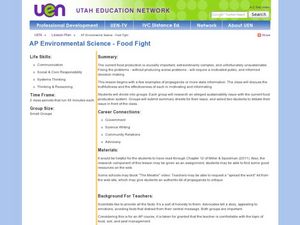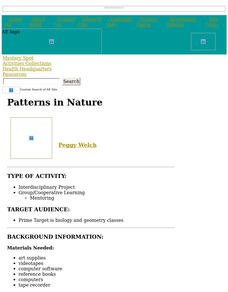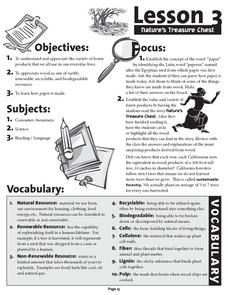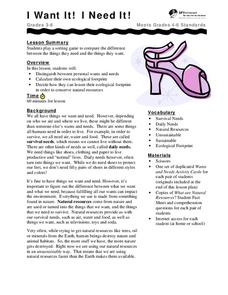Curated OER
Careers in science and careers that support scientific research
Examine some of the occupations which relate to science. Work in small groups of four. Group A is given a copy of a daily television guide to highlight all the television programs that have a science or mathematics focus. Group B is...
Curated OER
AP Environmental Science-Food Fight
The content in this lesson is of a controversial nature. Please review to make sure it is suitable for your class. A video, The Meatrix is shown to the class, and then they discuss the emotionally-charged language that it uses. They are...
Chicago Botanic Garden
Nature Walk and Ecosystem Introduction
A food web has no organism higher than a tertiary consumer because there wouldn't be enough energy left to sustain them. The fourth installment in a seven-part series begins with a nature walk to get pupils thinking about their...
Polar Trec
Nature's Density Column
Nature provides density columns in the polar regions that provides food for many animals. Young scientists build their own density columns with water in order to answer analysis questions. Through a slideshow presentation, scholars...
Curated OER
What is the Nature of Science?
Conduct a survey about the nature of science with your high schoolers. They will record their responses in a table and then discuss the implications of scientific theory. Note: There are activity sheets, and forms included with this lesson.
Curated OER
Patterns in Nature
Research patterns in nature which illustrate biological and mathematical concepts. Your class will discover and explore aspects of fractals, Fibonaccis numbers, whale and butterfly migration patterns, whale identification, flower...
Curated OER
What Is Natural?
Your junior highers will learn about which objects are natural and classify objects as abiotic or biotic. Your class will trace human products to their natural resources using matter cycles and then create their own definition of nature.
Curated OER
Science-Observation Skill Builders
Pupils explore observation while making connections between observation skills and careers (like how farmers observe the weather). They view a variety of nature photographs on the computer and practice their observation skills by...
Forest Foundation
Nature's Treasure Chest
Renewable, recyclable, and biodegradable. As part of their study of the forest ecosystem, class members read "Nature's Treasure Chest" about the many products made from trees and then craft their own recycled paper.
Curated OER
Exploring Living Science Careers
Use a variety of group activities to explore living science careers. Living science careers include everything from a food scientist or farmer to a veterinarian or agricultural economist. Kids will discuss 31 different careers in this...
EngageNY
End of Unit Assessment Part II: Science Talk
Scholars complete Part 2 of their end of unit assessment by having a science talk. Pupils pair up to answer questions about what makes a natural disaster. As one learner talks, the other records what is said. They then trade places.
Curated OER
Selecting the Tap: Water Safety
Examine water as a scarce natural resource instead of taking it for granted. Middle schoolers identify the traits of potable water, and research local water sources to determine if they are impaired or not.
Global Oneness Project
The Consciousness of Nature
Scholars voice their opinions about animal consciousness with an article that challenges common ideas about nature. After reading the article, learners engage in a thoughtful discussion before writing out their arguments in a persuasive...
City and County of San Francisco
I Want It! I Need It!
Discuss wants and needs with your elementary ecologists and get them to consider what would happen to our natural resources if we all got everything that we want. Learners play a card sorting game and take an ecological footprint quiz on...
Howard Hughes Medical Institute
The Making of the Fittest: Got Lactase? The Co-evolution of Genes and Culture
Got milk? Only two cultures have had it long enough to develop the tolerance of lactose as an adult. Learn how the responsible genes evolved along with the cultures that have been consuming milk. This rich film is supplied with a few...
Global Oneness Project
Learning with Nature
Think outside the box - and think about education beyond the classroom walls - with a resource that has your critical thinkers watching a video about a nursery in Scotland that lets youngsters roam wild in a forest. Viewers reflect on...
Virginia Department of Education
The Cycles of Nature
Encourage peer collaboration and assist with the creation of visual aids to identify carbon, water, and nitrogen cycles as your class learns more about nature. They discuss relative information, create a visual aid depicting the chosen...
Virginia Department of Education
Owl Family Natural Selection
How do genetic mutations within a population lead to future variations? Provide your class with the resources to answer this question and more upon completing an activity on natural selection. The entire class participates in a fun role...
Curated OER
Does Mother Nature Know Best?
Investigate herbal medicine in the science or health classroom with this lesson from the New York Times. After a discussion about class members beliefs about and experiences with herbal medicines, pupils read an article that might impact...
Curated OER
How Does Your Garden Grow? Discovering How Weather Patterns Affect Natural Cycles
For the warm-up in this cool climate lesson, you will need to click on "Mapping" and then "US Mapping" once you arrive at NOAA's "US Climate at a Glance" page. Earth science explorers realize that 2012 was a warm winter for us. They read...
Curated OER
A Simple Model for Natural Selection
Do you have what it takes to survive as a fit predator or will elusive prey lead to your extinction? Find out in a creative natural selection activity. Using different colors and shapes of grains to represent different species and...
Curated OER
A Model for Natural Selection- Spaghetti Worms
Does the early bird really get the worm? If so, which color of worm does it prefer? In an exciting and easy week-long field investigation, young field biologists set up a one square meter feeding area for birds. If you have a webcam,...
EngageNY
Building Background Knowledge and Making Inferences: What Is a Natural Disaster?
That's a disaster! Scholars complete a gallery walk to view images and make inferences about natural disasters. They fill out a note catcher about what they observe and infer any questions they may have. They then participate in a World...
Curated OER
Natural Beauty: Looking Sharp
Students create covers for their "nature journals" using watercolor techniques and the artistic ideas of color, depth, and focal point. This instructional activity can be used in the Science or Art classroom and meets national standards...
Other popular searches
- Science Natural Disasters
- Science Natural Phenomena
- Science Natural Resources
- Science Natural Events
- Science Natural Cycles
- Natural Science Grade 9
- 4th Grade Natural Science
- Natural Science Powerpoint
- Natural Science Grade 3
- Science Materials Natural

























